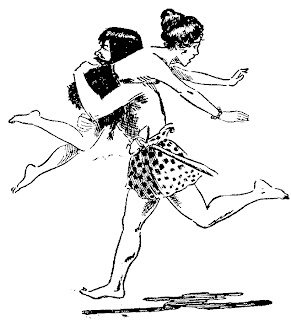 From a review in The Nation of a field I never knew existed, until reading this piece: literary Darwinism. After you read the review you will realize that you can continue to ignore this rather silly strand of literary studies. But the introduction to the review does a nice job of critiquing the broader field of evolutionary psychology, upon which literary Darwinism is based. Excerpts follow:
From a review in The Nation of a field I never knew existed, until reading this piece: literary Darwinism. After you read the review you will realize that you can continue to ignore this rather silly strand of literary studies. But the introduction to the review does a nice job of critiquing the broader field of evolutionary psychology, upon which literary Darwinism is based. Excerpts follow:The appeal of evolutionary psychology is easy to grasp... The last few decades have left us so profoundly disoriented about the most urgent personal matters--gender roles, sexual norms, the possibility of creating lasting romantic relationships, not to mention absolutely everything to do with family structure--that it's no surprise to find people embracing a theory that promises to restore order. Once we had religion to tell us who we are. Then, for a while, we had Freud. Now we have evolutionary psychology, which, as an attempt to construct a science of human nature on Darwinian principles, marshals two of the most powerful ideas in contemporary culture: science, our most authoritative way of knowing, and nature, our highest ground of moral appeal...Equip yourself with a few basic concepts--natural selection, inclusive fitness, mating choice--and you, too, can explain the mysteries of human existence. That evolutionary psychology has no real intellectual credibility, that mainstream biology regards it as a house of sand, rarely seems to come up...
the problem lies less in the field's goals than in its claims. Much of its opposition is misguided and out-of-date... those who reject the notion of human psychology as a product of evolution (that is, of nature rather than culture) would undoubtedly recoil at the idea that human physiology is not a product of evolution. The only alternative is creationism...Surely no one would dispute that there is a universal bee nature or dog nature or chimpanzee nature. Why not then acknowledge, at least in principle, a universal human nature, however various its elaborations in culture?
The question is, What does it consist of, how did it arise and can we discover it? Here is where evolutionary psychology falls down. EP claims that the human mind evolved in the Pleistocene, the 1.6 million years during which Homo sapiens emerged on the African savanna. EP seeks to identify apparently innate and cross-culturally universal aspects of human behavior (like speech), then tries to construct scenarios to explain why such behaviors would have been adaptive--would have promoted individual or collective survival and reproduction--in the Pleistocene environment. This all sounds reasonable until you discover that: (1) we don't actually know what the Pleistocene environment looked like; (2) we don't know how our Pleistocene ancestors lived; and (3) we now believe that evolution might happen a lot faster than we used to think, so much of our psychology may not be a product of the Pleistocene at all but of the 10,000 years since the emergence of civilization. There are other problems with the stories that EP likes to make up about how we got to be the way we are. They still have no support in genetics. If something's not genetic, it's not evolved. Also, not all behaviors (or physiological structures) are the result of selection pressures. Some are byproducts of other capacities, as literacy clearly is. Some are the result of functional shifts (insects' wings, for example, seem to have developed at first to regulate heat). Finally, there are some deeply ingrained human behaviors that seem very hard to justify in adaptive terms.

No comments:
Post a Comment